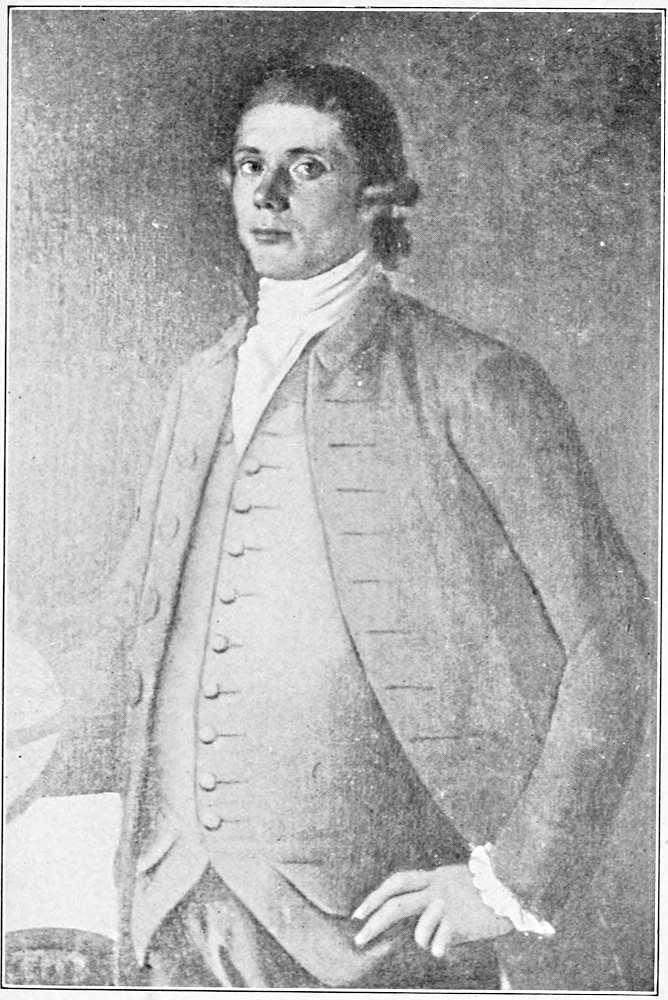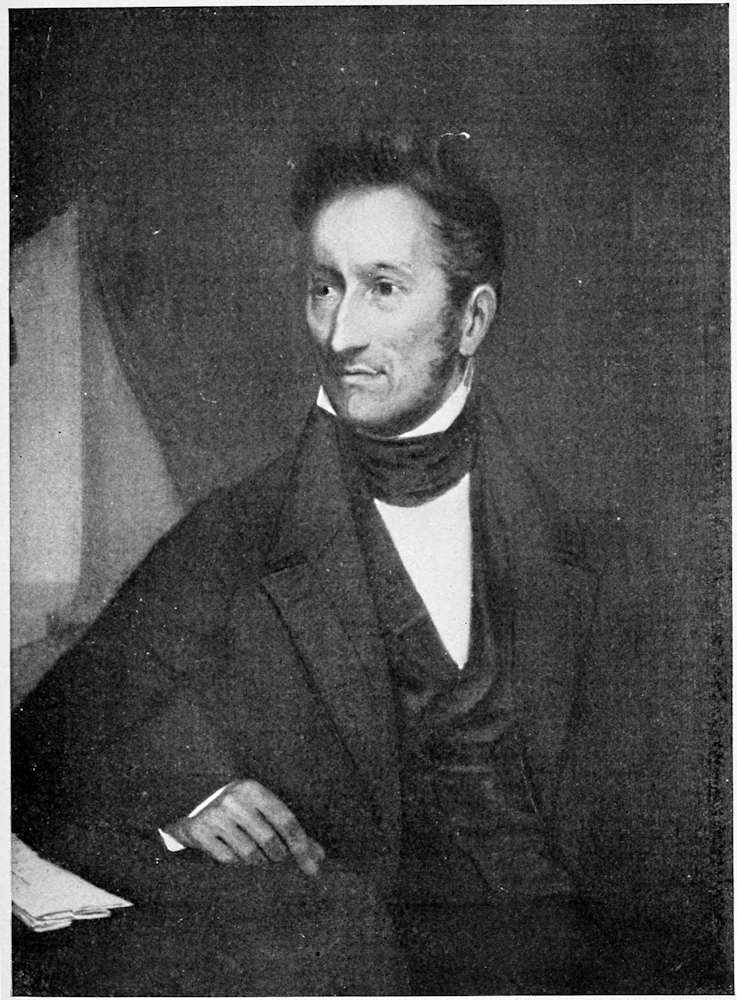https://ebookmass.com/product/optical-coherencetomography-angiography-atlas-a-case-studyapproach-1st/
Download more ebook from https://ebookmass.com
More products digital (pdf, epub, mobi) instant download maybe you interests ...
Atlas of Retinal OCT: Optical Coherence Tomography 1st Edition Darin Goldman
https://ebookmass.com/product/atlas-of-retinal-oct-opticalcoherence-tomography-1st-edition-darin-goldman/
Handbook of Retinal OCT: Optical Coherence Tomography E-Book 2 Edition Edition Jay S. Duker
https://ebookmass.com/product/handbook-of-retinal-oct-opticalcoherence-tomography-e-book-2-edition-edition-jay-s-duker/
Infectious Diseases: A Case Study Approach 1st Edition
Jonathan Cho
https://ebookmass.com/product/infectious-diseases-a-case-studyapproach-1st-edition-jonathan-cho/
Prosthetics & Orthotics in Clinical Practice A Case Study Approach 1st Edition, (Ebook PDF)
https://ebookmass.com/product/prosthetics-orthotics-in-clinicalpractice-a-case-study-approach-1st-edition-ebook-pdf/
Medical Nutrition Therapy: A Case Study Approach 5th Edition, (Ebook PDF)
https://ebookmass.com/product/medical-nutrition-therapy-a-casestudy-approach-5th-edition-ebook-pdf/
Gender in the Workplace: A Case Study Approach (NULL) –Ebook PDF Version
https://ebookmass.com/product/gender-in-the-workplace-a-casestudy-approach-null-ebook-pdf-version/
Electromyography in Clinical Practice: A Case Study Approach 2nd Edition, (Ebook PDF)
https://ebookmass.com/product/electromyography-in-clinicalpractice-a-case-study-approach-2nd-edition-ebook-pdf/
Medical Nutrition Therapy: A Case Study Approach 6th Edition Marcia Nahikian Nelms
https://ebookmass.com/product/medical-nutrition-therapy-a-casestudy-approach-6th-edition-marcia-nahikian-nelms/
Electromyography in Clinical Practice: A Case Study Approach 3rd Edition Edition Bashar Katirji
https://ebookmass.com/product/electromyography-in-clinicalpractice-a-case-study-approach-3rd-edition-edition-basharkatirji/
Another random document with no related content on Scribd:
the owners of the vessel, the library thus captured was sold at a very low rate, and in this manner was laid the foundation upon which has since been established the Philosophical Library so-called, and the present Salem Atheneum. Thus in early life I found near me a better collection of Philosophical and Scientific books than could be found in any other part of the United States nearer than Philadelphia, and by the kindness of its proprietors I was permitted freely to take the books from that library and to consult and study them at pleasure. This inestimable advantage has made me deeply a debtor to the Salem Atheneum, and I do therefore give to that institution the sum of one thousand dollars, the income thereof to be forever applied to the promotion of its objects, and the extension of its usefulness.”
Dr. Richard Kirwan had the shadowy consolation of being compelled to furnish enlightenment to this hostile port of Salem, but the most important benefit reaped by this singular privateering adventure was the stimulus it conveyed to the mind of young Nathaniel Bowditch. He became wholly submerged in the volumes of the Transactions of the Royal Society of London. Indeed, he copied one book after another, making these manuscripts with infinite pains in order that he might possess them and carry them to sea with him. He was in his teens when he copied “A complete collection of all the Mathematical Papers of the Philosophical Transactions; Extracts from various Encyclopedias and from the Memoirs of the Paris Academy; a complete copy of Emerson’s Mechanics, a copy of Hamilton’s Conics; extracts from Gravesand’s and Martyn’s Philosophical Treatise; extracts from Bernoulli, etc., etc.”
At the age of seventeen Bowditch began to learn Latin without a teacher in order that he might read Newton’s Principia, and when he was old enough to vote “he was unsurpassed in mathematical attainments by any one in the Commonwealth.” But he must needs earn his bread and go to sea, and so in 1795 Nathaniel made his first voyage as captain’s clerk in the Salem ship Henry, Captain Prince, to Mauritius. His sea life covered a period of nine years, during which he made five voyages, one of them to Manila in 1796-
7, in the ship Astrea, as supercargo with Captain Prince. The Astrea was the first American ship to fly the stars and stripes in the harbor of Manila, a fact of some historical worth. The American trade to the Orient was then in its beginnings and it was Elias Hasket Derby, who, with characteristic enterprise, sent the Astrea to Manila in search of sugar, pepper and indigo, of which she fetched home a large and valuable cargo.
Nathaniel Bowditch kept a journal of this voyage as was required by the laws of the East India Marine Society, and his journal, written in a precise and delicate hand, is preserved in the Society’s collection of records. His impressions of the capital city of the Philippines in 1797 read in part as follows:
“The city of Manila is about three or four miles in circumference, is walled all around, and cannon are placed at proper intervals, but we were unable to get much information with respect to the state of the place, as they were shy of giving any information to foreigners. The buildings within the wall are all of stone, and none except the churches is more than two stories high, on account of the violent earthquakes which they generally have at the breaking up of the monsoons. The month of March is when they most expect them, but on the fifth of November, 1797, we experienced several violent shocks at about 2 P. M. which came from the northward, and proceeded in a southerly direction, continuing with violence nearly two minutes. It threw down a large house half a league from the city, untiled several buildings, and did much other damage. It was not observed on board the ship lying off the bar. The motion of the earthquake was quicker than those usual in America, as the latter are generally preceded by a rumbling noise; the former was not.
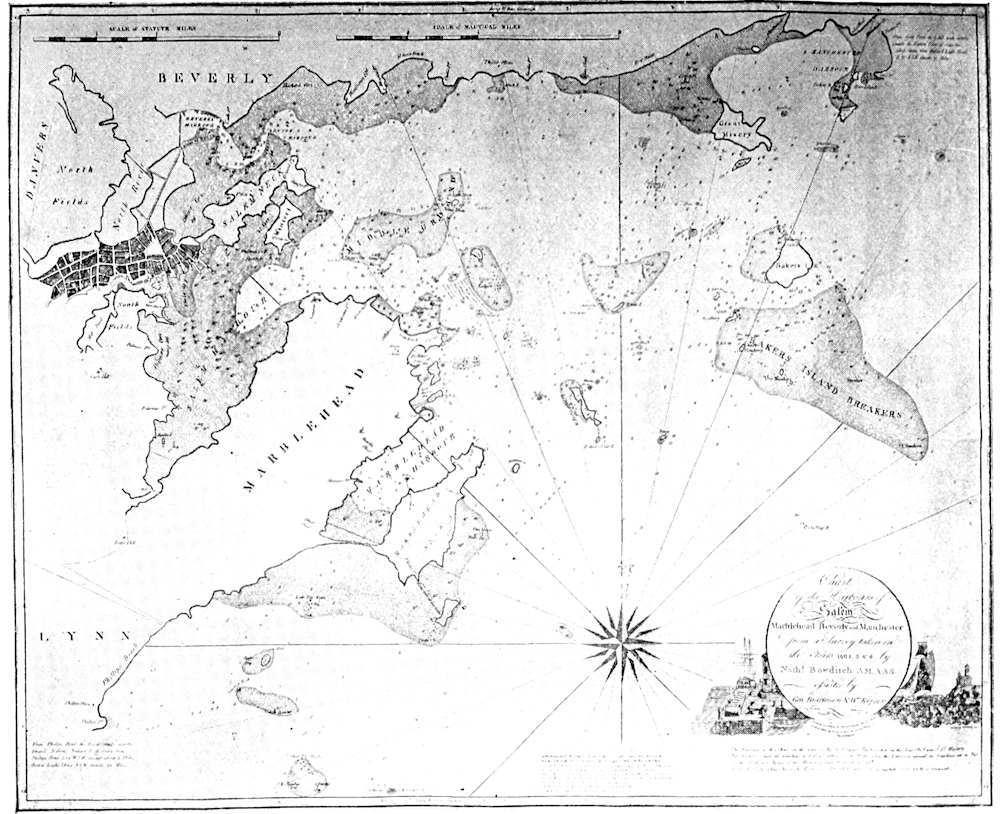
Nathaniel Bowditch’s chart of Salem harbor
“The suburbs of Manila are very extensive; most of the business is done there. The houses of the wealthier class are of two stories, built of bamboo with thatched roofs. No house can be built in the suburbs without the particular permission of the Governor, fearing if they were too high an enemy might make use of them, as was the case when the English took the place formerly, for one of the churches near the walls was very serviceable to them.
“All the women have a little of the Indian blood in their veins, except the lady of the Governor and two or three others, though by a succession of intermarriages with Europeans they have obtained a fair complexion. The natives (like all other Malays) are excessively
fond of gaming and cock-fighting. A theatre is established for the latter business from which the government draws an immense revenue, the diversion being prohibited at any other place. Sometimes there are five or six thousand spectators, each of whom pays half a real. A large sum arises from the duties on tobacco and cocoa wine. Tobacco is prohibited, but if you smuggle any on shore it cannot be sold for more than the ruling cost in America, notwithstanding the price is very high. Particular people, licensed by the King, are the only persons allowed to deal in it.
“All the natives chew dreca and betel, though not mixed with opium as in Batavia. This with chewing and smoking tobacco make their teeth very black. The segars used by the women, and which they smoke all day, are made as large as they can possibly get into their mouths. The natives are about as honest as their neighbors, the Chinese; they stole several things from us, but by the goodness of the police we recovered most of them.
“On the second of December, 1797, thieves broke into the house where we lived, entered the chamber where Captain Prince and myself were asleep, and carried off a bag containing $1,000 without awakening either of us, or any of the crew of the long-boat sleeping in an adjoining chamber.
“The guard boat discovered them as they were escaping and pursued them. They, in endeavoring to escape, ran afoul of a large boat, which, upsetting them, the money went to the bottom, and, what was worse, the bag burst and the money was all scattered in the mud, where the water was eight feet deep. However, by the honesty of the captain of the guard, most of it was recovered. The thieves were caught, and, when we were there in 1800, Mr. Kerr informed us that they had been whipped, and were to be kept in servitude several years.
“The same day another robbery was committed, equally as daring. The day the indigo was shipped, the second mate came ashore with several of the people to see it safe aboard. The boats we had provided, not taking all of it, we sent the remainder aboard with a
black fellow as a guard, who was esteemed by Mr. Kerr as an honest man, but he had been contriving, it seems, to steal a couple of boxes. When the cases containing the indigo had passed the bar, a small boat came aboard with two boxes filled with chips, stones, etc., appearing in every respect like those full of indigo, and, pretending that we had put on board two wrong boxes, they exchanged their boxes for two real boxes of indigo, but, in bringing them ashore, they were detected and the indigo returned.
“There are great numbers of Chinese at Manila. It is from them most of the indigo is purchased. They trade considerably with China; their junks arrive at Manila in January, and all their goods are deposited in the custom-house. Some of these cargoes are valued at a million of dollars, the duties on which amounted to nearly $100,000. The Chinese at Manila retain all the customs of their country, excepting those respecting religion and a few other things of small moment.”
Captain Benjamin Carpenter of the Hercules, 1792
When the Astrea arrived at Manila on this voyage, Captain Prince was asked by another shipmaster how he contrived to find his way in the face of the northeast monsoon by dead reckoning. He replied that “he had a crew of twelve men, every one of whom could take and work a lunar observation, as well for all practical purposes, as Sir Isaac Newton himself, if he were alive.”
During this dialogue Nathaniel Bowditch, the supercargo, who had taught these sailors their navigation while at sea, “sat as modest as a maid, saying not a word but holding his slate pencil in his mouth,” according to Captain Prince who also used to relate that “another person remarked there was more knowledge of navigation on board that ship than ever there was in all the vessels that have floated in Manila Bay.”
During his seafaring years this singular mariner, Nathaniel Bowditch, learned French thoroughly, and studied Italian, Portuguese and Spanish. One who sailed with him said, “all caught a zeal to learn on board his ships. The whole crew of twelve men on board the Astrea later became captains, first and second mates. At sea his practice was to rise at a very early hour in the morning, and pursue his studies till breakfast, immediately after which he took a rapid walk for half an hour, and then went below to his studies till half-past eleven o’clock, when he returned and walked till twelve o’clock, the hour at which he commenced his meridian observations. Then came dinner, after which he was engaged in his studies till five o’clock; then he walked till tea time, and after tea was at his studies till nine o’clock in the evening. From this hour till half-past ten o’clock he appeared to have banished all thought of study, and while walking he would converse in the most lively manner, giving us useful information, intermixed with amusing anecdotes, and hearty laughs, making the time delightful to the officers who walked with him, and who had to quicken their pace to accompany him. Whenever the heavenly bodies were in distance to get the longitude,
night or day, he was sure to make his observations once and frequently twice in every twenty-four hours, always preferring to make them by the moon and stars on account of his eyes. He was often seen on deck at other times, walking rapidly and apparently in deep thought, when it was well understood by all on board that he was not to be disturbed, as we supposed he was solving some difficult problem. And when he darted below the conclusion was that he had got the idea. If he was in the fore part of the ship when the idea came to him, he would actually run to the cabin, and his countenance would give the expression that he had found a prize.”
In keeping with this picture is the story of Bowditch’s behavior when during his third voyage, from Cadiz to Alicante, his ship was chased by a French privateer. The Yankee captain decided to make a fight of it and Bowditch was assigned to hand powder on deck from the magazine. One of the officers, going below after the vessel had been cleared for action found the supercargo sitting on a keg of powder with his slate in his lap, absorbed in making calculations.
Nathaniel Bowditch had made the sea serve him, both to gain a livelihood and to test his theories of practical navigation for the benefit of his fellow seamen. But he did not consider “The Practical Navigator” to be an achievement by which his intellectual powers should be measured. His magnus opus, the fond labor of his best years was the translation and commentary of the monumental work of the great French astronomer, La Place, entitled “Mécanique Celeste” (Celestial Mechanics). So much of his own learning appeared in his exhaustive notes that the American edition of four volumes was a lasting memorial to the industry, knowledge and researches of Nathaniel Bowditch, and was the foremost American achievement in scientific letters during the early nineteenth century. It won a solid fame for Nathaniel Bowditch, both at home and abroad. Where one American, however, has heard of his edition of Mécanique Celeste, a thousand have studied the pages of his “Practical Navigator,” which is a living book to-day.
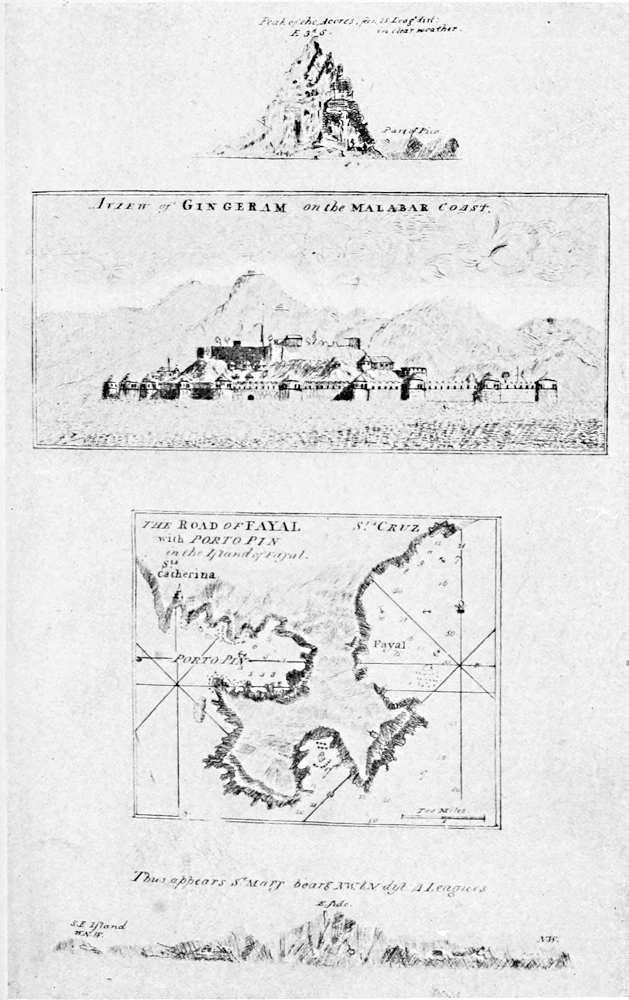
From the log of the Hercules, showing the beautiful penmanship with which Captain Carpenter adorned his sea journals
Shortly after he retired from the sea, Doctor Bowditch was elected president of the Essex Fire and Marine Insurance Company and continued in that office until 1823, declining professorships at Harvard, West Point and the University of Virginia. In 1823 he was persuaded to move his residence to Boston as actuary of the Massachusetts Hospital Life Insurance Society which position he held until his death in 1836. A self-taught scientist, a notable benefactor of mankind, Nathaniel Bowditch was with singular fitness, a son of Salem in the days when its splendid race of navigators were his fellow-townsmen. He loved the storied seaport in which he was born, and he was generally beloved for those very genuine qualities characteristic of the shipmasters among whom he lived. There was a rare simplicity and an absence of all false pride in the reasons which he gave to his executors for making a bequest to the Salem Marine Society.
“He told us, and all our children,” his sons wrote to the officers of the society, “at the time of executing his will that his father, Habakkuk Bowditch, for nearly twenty years received from your charity fund the annual sum of fifteen dollars or thereabouts, so that his own food and clothing when a boy were in part derived from this source. Under these circumstances, we felt with him, that he had incurred a debt of gratitude toward your society which justified and indeed required from him an acknowledgement in return.”
FOOTNOTES:
[35] The Boston ship Massachusetts sailed for the East Indies in 1790. She was the largest merchant vessel built in the United States up to that time, and was especially designed and equipped for the Oriental trade, measuring six hundred tons and carrying a
crew of eighty men. Winthrop L. Marvin’s American Merchant Marine states:
“In view of the importance of the Massachusetts it is astonishing to learn from Delano’s Narrative that she went to sea without a chronometer, and without a single officer who could work a lunar observation. This compelled her to creep down the coast of Africa, feeling her way along, as it were, by the discolored current. She tried to sight the Cape Verde Islands to correct her reckoning, but missed them, and standing too far back toward the East came near bringing up on the inhospitable sands of South Africa. But the worst miscalculation of all was the missing of Java Head, that great landmark of East India voyagers. This blunder compelled the Massachusetts to make at least fifteen extra degrees of ‘easting’ and cost her about three weeks’ time. If a great ship like the Massachusetts were so ill-provided with the instruments of navigation, it is inexplicable how the small ships of poorer owners ever found their way around the Cape of Good Hope, and through the labyrinths of the East Indian Archipelago.”
[36] Dr. Richard Kirwan (1733-1812) was born in Cloughballymore, Ireland. He was a distinguished investigator and writer in the fields of mineralogy, chemistry, and meteorology, a member of the Edinborough Royal Society, the Royal Irish Academy, and a number of foreign academies. He received an honorary degree of LL.D. from the University of Dublin, and declined a baronetcy offered him by Lord Castlereagh. His works were translated into Russian, German and French. The capture of Doctor Kirwan’s library was a misfortune of sufficient importance to find mention in the National Dictionary of Biography which relates:
“In 1776, Kirwan, having conformed to the established church, was called to the Irish bar, but threw up his studies after ten years, and pursued scientific studies in London, exchanged for Greek at Cregg in 1773. He resided in London from 1777 to 1787, and became known to Priestley, Cavendish, Burke, and Horne Tooke. He corresponded with all the savants of Europe; his Wednesday evenings in Newman St. were the resort of strangers of distinction; the Empress Catharine of Russia sent him her portrait. His library, dispatched from Galway to London on 5th Sept., 1780, was captured by an American privateer. Elected a fellow of the Royal Society on 24th Feb. 1780, he received the Copley medal in 1782 for a series of papers on chemical affinity.”
[37] A probable error of memory as the library was on its way to England according to other sources of information.
CHAPTER XVI
THE VOYAGES OF NATHANIEL SILSBEE[38]
(1792-1800)
NEITHER myself nor the chief mate of the ship for that voyage (Mr. Charles Derby) had attained the age of twenty-one years when we left home. I was not then twenty years of age, and it was remarked by the naval officer on taking the ship’s papers from the Custom House that it was the first instance in which papers had been issued from that office to a vessel bound to the East Indies, the captain and chief mate of which were both minors.”
This is what young Nathaniel Silsbee was able to record of the year 1792 when he took command of the new ship Benjamin, one hundred and sixty-one tons, laden with a costly cargo of merchandise and bound out from Salem for the Cape of Good Hope and India, “with such instructions as left the management of the voyage very much to my own discretion.” It was only four years earlier than this that the Salem ship Atlantic had flown the first American flag ever seen in the harbors of Bombay and Calcutta, and the route to those distant seas was still unfamiliar to these pioneers who swept round the Cape of Good Hope to explore new channels of trade on the other side of the world.
In these latter times a nineteen-year-old lad of good family is probably a college freshman without a shadow of responsibility, and whose only business care has to do with the allowance provided by a doting parent. He is a boy, and is ranked as such. When our forefathers were creating a merchant marine whose achievements form one of the finest pages of American history, seafaring lads were men at twenty, ruling their quarterdecks and taming the rude
company of their forecastles by weight of their own merits in brains and pluck and resourcefulness.
Nathaniel Silsbee, a captain in the India trade at nineteen, was not a remarkably precocious mariner a century and more ago. He could say of his own family:
“Connected with the seafaring life of myself and my brothers, there were some circumstances which do not usually occur in one family. In the first place each of us commenced that occupation in the capacity of clerk, myself at the age of fourteen years; my brother William at about fifteen, and my brother Zachariah at about sixteen and a half years of age. Each and all of us obtained the command of vessels and the consignment of their cargoes before attaining the age of twenty years, viz., myself at the age of eighteen and a half, my brother William at nineteen and a half, and my brother Zachariah before he was twenty years old. Each and all of us left off going to sea before reaching the age of twenty-nine years, viz., myself at twenty-eight and a half; William at twenty-eight, and Zachariah at twenty-eight and a half years.”
In other words, these three brothers of Salem had made their fortunes before they were thirty years old and were ready to stay ashore as merchants and shipowners, backed by their own capital. A splendid veteran of their era, Robert Bennet Forbes of Boston pictured his very similar experience in this manner:
“At this time of my life (1834), at the age of thirty, I had become gray and imagined myself approaching old age. I had attained the summit of my ambition. I was what was then thought to be comfortably off in worldly goods; I had retired from the sea professionally and had become a merchant; I had contributed something toward the comfort of my mother; I had paid off large debts contracted in building my ship, and I began to think more of myself than I ever had done. Looking back to 1824 when I was content in the command of a little ship of 264 tons, on a salary of six hundred dollars per annum, I conceded that I had arrived at the
acme of my hopes. I had been blessed with success far beyond my most ardent expectations.
“Beginning in 1817, with a capital consisting of a Testament, a ‘Bowditch,’ quadrant, chest of sea clothes and a mother’s blessing, I left the paternal mansion full of hope and good resolution, and the promise of support from my uncles. At the age of sixteen I filled a man’s place as third mate; at the age of twenty I was promoted to a command; at the age of twenty-six I commanded my own ship; at twenty-eight I abandoned the sea as a profession, and at thirty-six was at the head of the largest American house in China.”
Nathaniel Silsbee, therefore, was in tune with the time he lived in when at fourteen he embarked on his first voyage, from Salem to Baltimore as a captain’s clerk in a small schooner. His father had been an owner of several vessels in the West India trade, but losses at sea and other commercial misfortunes compelled him to take the boy from school and launch him in the business of seafaring. Three voyages in a coaster were followed by several months of idleness during which he “was uneasy and somewhat impatient” until a chance was offered to ship as supercargo of the brig Three Sisters bound on one of the first American voyages around the Cape of Good Hope in the winter of 1788. His wages for that voyage were five dollars a month, and all the property which his father could furnish as an “adventure” or private speculation, was six boxes of codfish worth eighteen dollars, “most of which perished on the outward passage.”
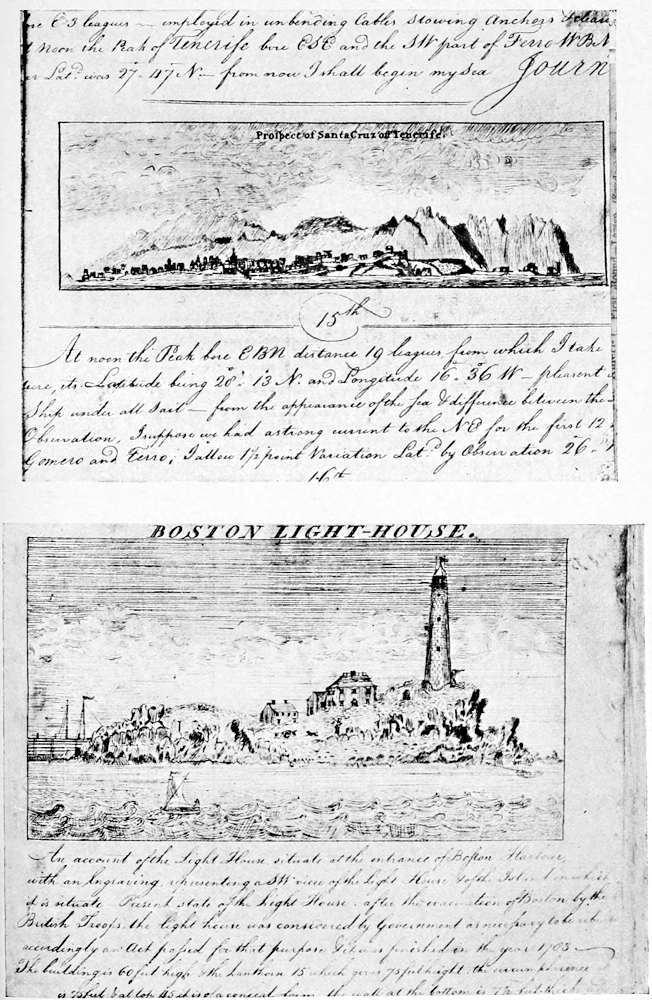
Pages from the log of the ship Hercules, 1792, remarkable for the beauty of their draftsmanship in pen and ink. These drawings were made in the log while at sea
The ThreeSisterswent to Batavia, thence to China where she was sold, and her crew came home in another Salem ship, the Astrea. Young Silsbee studied navigation in his spare time at sea, and gained much profit from the instruction of the captain. His strenuous boyhood seems remote in time when one finds in his memoirs that “while absent on that voyage the present constitution and form of the government of the United States which had been recommended by a convention of delegates from the several states, held in 1787, was adopted by eleven of the then thirteen United States, and went into operation on the fourth day of March, 1789, with George Washington, as President and John Adams as Vice-President of the United States.”
A week after his return from China Nathaniel was setting out with his father in a thirty-ton schooner for a coasting trip to Penobscot, these two with brother William comprising the ship’s company. They made a successful trading voyage, after which the youthful sailor sailed to Virginia as captain’s clerk. He was now seventeen, a tough and seasoned stripling ready to do a man’s work in all weathers. At this age he obtained a second mate’s berth on a brig bound to Madeira. When she returned to Salem he was offered the command of her, considerably in advance of his eighteenth birthday. The death of his mother recalled him to Salem and deferred his promotion.
In the same year, however, we find him captain of a sloop and off to the West Indies with specie and merchandise. The boyish skipper was put to the test, for a succession of furious gales racked his vessel so that she was sinking under his feet, and he “endured such incessant and intense anxiety as prevented my having a single moment of sound sleep for thirteen entire days and nights.” He made a West Indian port, however, and his vessel was declared unseaworthy by a survey of shipmasters and carpenters. “At a
somewhat later age,” he confesses and you like him for it, “I should probably have acceded to that decision and abandoned the vessel, but I then determined otherwise, caused some repairs to be made on the vessel, which I knew to be entirely uninsured, invested the funds in West India produce, and proceeded therewith to Norfolk, and thence to Salem where the vessel was considered unfit for another voyage, and where I had the good fortune to be immediately offered by the same owner the charge of a brig and cargo for the West Indies.”
It was after this next voyage that Captain Silsbee, veteran mariner that he was at nineteen, was given the ship Benjamin already mentioned. In those early foreign voyages of one and two years duration, the captain was compelled to turn his hand to meet an infinite variety of emergencies. But he usually fought or blundered a way through with flying colors, impelled by his indomitable confidence in himself and the need of the occasion. This young shipmaster of ours had somehow qualified himself as a rough-andready surgeon, or at least he was able to place one successful and difficult operation to his credit. He was already living up to the advice of another New England mariner whose code of conduct was: “Always go straight forward, and if you meet the devil, cut him in two and go between the pieces.” This is how Captain Silsbee rose to the occasion:
“In an intensely cold and severe storm on the first night after leaving home, our cook (a colored man somewhat advanced in age) having preferred his cooking-house on deck to his berth below for a sleeping place, had his feet so badly frozen as to cause gangreen to such an extent as to render amputation of all his toes on both feet absolutely necessary for the preservation of his life. Having neither surgical skill nor surgical instruments on board the ship, the operation was a very unpleasant and hazardous one, so much so that no one on board was willing to undertake the direction of it. I was most reluctantly compelled to assume, with the aid of the second mate, the responsibility of performing the surgical operation with no other instruments than a razor and a pair of scissors, and
which, in consequence of the feeble state of the cook’s health required two days to accomplish.
“The cook was very desirous to be landed and left at one of the Cape de Verde Islands, and for that purpose I proceeded to the Island of St. Jago, where I found an English frigate at anchor. Her surgeon came on board our ship at my request and examined the cook’s feet and to my great satisfaction, pronounced the operation well performed, assured me that there remained no doubt of his recovery, and advised me by all means to keep him on board ship under my own care in preference to putting him ashore. With the cook’s approbation I followed the surgeon’s advice and in the course of a few weeks the cook was able to resume his duties, recovered his usual health and made several subsequent voyages.”
After dispatching the business of the cook, the boy skipper proved his ability as a merchant of quick adaptability and sound judgment. While on the passage from the Cape of Good Hope to the Isle of France (Mauritius) he fell in with a French frigate which gave him news of the beginning of war between France and England. When this news reached the Isle of France prices rose by leaps and bounds and the cargo of the Benjamin was promptly sold at a profit that dazzled her commander. As fast as payments were made he turned the paper currency into Spanish dollars. Then for six months an embargo was laid on all foreign vessels in port. Captain Silsbee sat on his quarter deck and refused to worry. During this time in which his ship lay idle, his Spanish dollars increased to three times the value of the paper money for which he had shrewdly exchanged them, while for lack of an outlet the products of the island had not advanced in cost.
He therefore abandoned his plan of keeping on to Calcutta, sold his Spanish dollars, loaded his ship with coffee and spices at the Isle of France, and made a bee line for Salem. He proceeded no farther than the Cape of Good Hope, however, where he scented another opportunity to fatten his owner’s pockets. “I found the prospect of a profitable voyage from thence back to the Isle of France to be such,”
said he, “that I could not consistently with what I conceived to be my duty to my employer, (although no such project could have been anticipated by him, and although attended with considerable risk) resist the temptation to undertake it. At that time the Cape of Good Hope was held by the Dutch who had joined England in the then existing war against France, and it so happened that I was the only master of a foreign vessel then in port of whom a bond had not been required not to proceed from thence to a French port.... There being two other Salem vessels in port by which I could send home a part of my cargo, I put on board those vessels such portion of my cargo as I knew would considerably more than pay for the whole cost of my ship and cargo at Salem, sold the residue of the merchandise, and invested the proceeds in a full cargo of wine and other articles which I knew to be in great demand in those islands.”
At the Isle of France the captain sold this cargo for three times its cost, and again loaded for Salem. When he was almost ready to sail, it was reported that another embargo was to be laid forthwith. Hastily putting to sea he was obliged to anchor at Bourbon next day to take on provisions. Here he had a rather mystifying experience which he related thus:
“Just as I was about stepping from the wharf into my boat the French Governor of the island ordered me to his presence, which order I obeyed with strong apprehensions that some restraint was to be put upon me. On meeting the Governor he asked me, ‘How long do you contemplate staying in Bourbon?’ My answer was, ‘Not more than a day or two.’ ‘Can’t you leave here to-night?’ he asked. I replied, ‘If you wish it.’ He then added, ‘As you had the politeness to call on me this morning, and as I should be sorry to see you injured, hearken to my advice and leave here to-night if possible.’ He cautioned me to secrecy, and I was in my boat and on board my ship as soon as possible after leaving him. There was a war-brig at anchor in a harbor a little to windward of my own vessel; toward midnight I had the anchor hove up without noise, and let the ship adrift without making any sail until by the darkness of the night we had lost sight of the war-brig, when we made all sail directly from
the land. At daylight the war-brig was sent in pursuit of us, under a press of sail but fortunately could not overtake us, and toward night gave up the chase.”
The Benjaminarrived at Salem after a voyage of nineteen months. Nathaniel Silsbee had earned for his employer, Elias Hasket Derby, a net profit of more than one hundred per cent. upon the cost of the ship and cargo. The captain was given five per cent. of the outward, and ten per cent. of the value of the return cargo, as his share for the voyage besides his wages, and he landed in Salem with four thousand dollars as his perquisites, “which placed me in a condition to gratify the most anxious and at that time almost the only wish of my heart, which was to increase and secure the comforts of my mother, sisters and brothers.” And one of his first acts was to purchase the house and land formerly owned by his father, at a cost of fifteen hundred dollars and placed the whole of it at his mother’s disposal.
Being now twenty-one years old, and with a capital of two thousand dollars to risk as an “adventure” of his own account, Captain Silsbee took the Benjamin to Amsterdam, bound for India, with a cargo double the value of his first venture in her. He carried with him as clerk his brother William, aged fifteen, and furnished him with a sum of money as an “adventure” for his own account. Again the Isle of France lured him from the path to the Indies, and he sold his cargo there for “enormously high prices.” The young merchant navigator was so rapidly finding himself that he loaded his own ship and sent her home in command of her mate and then bought at the Isle of France another ship of four hundred tons for ten thousand dollars out of his employer’s funds. She was a new vessel, the prize of a French privateer and proved a good investment. Loading her with coffee and cotton and shipping a new crew he sailed for Salem in the wake of the Benjamin.
This homeward voyage was varied by an episode of such frequent occurrence in that era that it was commonplace. “A short time before our arrival in Boston,” Captain Silsbee related, “we were for two days
in company with and a few miles from a schooner which we suspected to be a privateer watching for a favorable opportunity to attack us. Having on board the ship six guns and twenty-five men, I was determined to resist, as far as practicable the attack of any small vessel. On the afternoon of the second day that this vessel had been dogging us, she bore down upon us with the apparent intention of executing what we had supposed to be her purpose, which we were, as I imagined, prepared to meet. But on calling the crew to quarters, I was informed by one of my officers that there were four or five seamen who were unwilling thus to expose themselves, alleging that they had neither engaged nor expected to fight.
Captain Nathaniel Silsbee
“On hearing this, all hands being on deck, I ordered every passage-way which led below deck to be securely fastened; then calling to me such of the crew as had not engaged to fight, I immediately sent them up the shrouds to repair the ratlin and to perform other duties which they had engaged to do, in the most exposed part of the ship. Finding themselves thus exposed to greater danger than their shipmates, they requested, before the schooner had come in gunshot of us, to be recalled from their situation and allowed to participate in the defense of the ship, which request was granted. All our six guns were placed on one side of the ship, and we succeeded by a simultaneous discharge of the whole of them, as soon as the schooner had approached within reach of their contents, in causing her to haul off, and hasten from us.”
Captain Silsbee was handling his employers’ ventures so shrewdly that his own shares in the cargoes was amounting to what seemed to him a small fortune. At twenty-two years of age, in 1795, he was able to purchase one-fourth part of a new ship called the Betsy. In this vessel as commander he sailed to Madras, Malaysia and Calcutta and returned after an absence of seventeen months. While at Madras he was a witness of and an actor in an incident of the kind which directly led to the second war between America and Great Britain, a collision at that time only sixteen years away. He tells it in these words, which clearly portray the lawless impressment of American seamen which was in operation on every sea.
“I received a note early one morning from my chief mate that one of my sailors, Edward Hulen, a fellow townsman whom I had known from boyhood, had been impressed and taken on board of a British frigate then lying in port. Receiving this intelligence I immediately went on board my ship and having there learned all the facts in the case, preceded to the frigate, where I found Hulen and in his presence was informed by the first lieutenant of the frigate that he had taken Hulen from my ship under a peremptory order from his
commander to ‘visit every American ship in port and take from each of them one or more of their seamen.’ With that information I returned to the shore and called upon Captain Cook, who commanded the frigate, and sought first by all the persuasive means that I was capable of using and ultimately by threats to appeal to the Government of the place to obtain Hulen’s release, but in vain. I then, with the aid of the senior partner of one of the first commercial houses of the place, sought the interference and assistance of the civil authorities of Madras, but without success, it being a case in which they said they could not interfere.
“In the course of the day I went again to the frigate and in the presence of the lieutenant, tendered to Hulen the amount of his wages, of which he requested me to give him only ten dollars and to take the residue to his mother in Salem, on hearing which the lieutenant expressed his perfect conviction that Hulen was an American citizen, accompanied by a strong assurance that if it was in his power to release him he should not suffer another moment’s detention, adding at the same time that he doubted if this or any other circumstance would induce Captain Cook to permit his return to my ship.
“It remained for me only to recommend Hulen to that protection of the lieutenant which a good seaman deserves, and to submit to the high-handed insult thus offered to the flag of my country which I had no means of either preventing or resisting, beyond the expression of my opinion to Captain Cook in the presence of his officers, and in terms dictated by the excited state of my feelings. After several years detention in the British Navy and after the Peace of Amiens, Hulen returned to Salem and lived to perform services on board privateers armed in Salem in the late war between this country and England.”
The extraordinary hazards of maritime commerce in the last years of the eighteenth century are emphasized in the story of the voyages made by Captain Silsbee to the Mediterranean in his next ship, the Portland, of which he owned one third. In the winter of
1797, he sailed from Boston with “brother William” as second mate, and stopping at Cadiz, learned of the decrees of the French government which made liable to condemnation every vessel of whatever nation, on board of which might be found any articles of the production or manufacture of Great Britain or any of its territories. While these decrees greatly increased the risk of capture in the Mediterranean, they also vastly enhanced the prices of Colonial merchandise. It seemed a commercial gamble worth the risk and Nathaniel Silsbee determined to make for Genoa or Leghorn. First, however, he erased from his nautical instruments the name of their English maker, put on shore a quantity of English coke from the cook’s galley, and weeded out everything else which could be considered as having a British pedigree.
He was no more than five days from Cadiz when a French privateer brig from Marseilles captured and carried the Portlandinto Malaga. The harbor was filled with American and other foreign vessels all flying the French flag, a depressing picture for the Salem crew. Every one of the vessels with their cargoes was condemned by the French, except the good ship Portland, Nathaniel Silsbee, master. His escape was due to his own bulldog persistence and resolute bearing in this grave crisis of his fortunes.
After anchoring at Malaga no boat was allowed to approach his ship, nor was he allowed to go ashore or to communicate with anyone until a day had passed. Then he was taken ashore, under guard of a squad of French soldiers, to the office of the French consul. The owner and commander of the privateer were present, and, single-handed, the American shipmaster was questioned in the most minute manner regarding every article of merchandise on board his vessel. Where were they produced? How and by whom imported into the United States? How came they into the possession of the owners of his ship? In his recollection of this extraordinary interview Captain Silsbee stated:
“And I was commanded by that mighty man, for at that time the French consul held the Spanish authorities of the place in as much
subjection as he did the humblest domestic, to answer each and all his lengthy and precise interrogatories in ‘five words....’
“After the examination was closed the record of it was placed with the ship’s papers on the shelves of the consular office with similar papers appertaining to thirty or forty other vessels then under sequestration. At about eleven o’clock at night I was informed that I might return to my ship in charge of the same guard which brought me ashore. I then asked the Consul when I might expect his decision upon my case. He said the decision must be ‘in turn,’ and that as there were many cases before mine, which would require possibly two or three months, but certainly not less than one month, mine could not be decided short of that time.... After some disputation upon that point I told the Consul that I would not leave his office, unless taken from thence by force, until his decision was made. Toward midnight the Consul and his clerk, together with the owner and officer of the privateer, went out of the office, leaving me there in charge of two porters and a watchman with whom I remained during that night, and saw nothing more of the Consul until about 9 o’clock in the morning. He expressed some surprise at finding me there, and asked if I could give him a written order to my officers directing them and the crew to assist in unclosing such parts of the cargo as would enable a survey which he would immediately appoint.”
The Yankee skipper cheerfully complied with this encouraging request, but stood by his guns in the consular office, nor did he budge until after a siege of twenty-four hours. He then deserted his post only to seek a notary under guard and enter a formal protest. Late in this second day the French consul reported that the survey showed every article of the cargo to be a production of British colonies, and therefore damned beyond repeal. Silsbee ingenuously replied that he had expected such a verdict but that along with other false statements, he begged leave to ask whether mace was considered the product of a British colony? This appeared to stagger the Consul, and Silsbee sought his bench and prepared to spend another night in the office. At nine o’clock in the evening the
harassed Consul capitulated, handed the ship’s papers to the master and told him to take his ship and go to the devil with her, or anywhere else he pleased.
Although he had been forty hours without sleep, the happy victor hastened to make ready for sea and escape from Napoleon’s clutches as soon as ever he could. Head winds baffled him, however, and while waiting at anchor he called to see the American consul whom he had not been permitted to visit or send for during his detention. So astonished was the representative of our infant republic that he refused to accept the word of the captain until he had seen the French consul in confirmation. It seemed preposterous that this Salem younker could have slipped out of the trap while a dozen or more American ships had been waiting for weeks and months doomed to condemnation. The Frenchman privately admitted that “the apparent determination of this terrible fellow not to leave his office until his case was decided, had not been without some effect on the time and character of his decision.”
It was out of the frying pan into the fire, for soon after reaching Genoa, a French army entered that port, declared an embargo, and began to fit out one fleet of the expedition which was to carry Napoleon’s legions to Egypt. The Generals in charge hired such vessels as they could and requisitioned such others as they wanted to use as transports. The Portland being the best and most comfortably fitted ship at Genoa, was selected, without the consent of her captain, for the transport of the Staff of the Army. Captain Silsbee failed to appreciate this honor, and after trying in vain to effect a release, decided to try to bribe his way clear. He had carried from home sufficient salt beef and pork for an India voyage, and he accidentally learned that the Bonaparte expedition was in great need of salted meat for the transports.
With sound strategy, Captain Silsbee had forty barrels of “salt horse” conveyed by night to a secure hiding place several miles beyond the outskirts of the city. Then he called upon the French
General and asked him if he did not want to buy some provisions for the fleet.
“He answered affirmatively,” wrote Captain Silsbee, “and added, ‘you know it is in my power to take it at my own price.’ I told him he should have every barrel of it at his own price, or even without price, if he would release my ship, that those were the terms, and the only terms on which he could or would have it. The general angrily threatened to take my provisions and make me regret having insulted him. Two days later he sent an order for me to appear before him which I did, when he demanded me to ‘inform him promptly’ where my forty barrels of provisions were, intimating a doubt of my having it, as his officers had not been able to find it. I told the General very frankly that if the ship which I commanded belonged wholly to myself, I might have felt not only willing but highly gratified to convey a part of the Staff of such an army on such an expedition, but that a large part of the ship and the proceeds of a valuable cargo belonged to other persons who had entrusted their property to my charge.... That avowal from me was met by a threat from the General to coerce me not only into a delivery of the provisions, but to the performance of any and every duty which he might assign to me; not only the ship, but likewise her captain, officers and crew had been placed under requisition by the French Republic; a requisition not to be frustrated, he said, by any human being, while a subaltern officer who was present added with enthusiasm, ‘Yes, sir, suppose God had one ship here, and the French wanted it, He must give it.’”
The Salem seafarer gave not an inch, but declared that a release of the ship was the only price which would drag the “salt horse” from its hiding place. On the following day, the General sent word that he was ready to yield to these terms. Napoleon’s veterans could not get along without salt pork, and Captain Silsbee triumphantly dragged his forty barrels into town. His ship was restored to him, the General even promised to pay for the stores, and the hero very rightly summed it up, “I could not but consider that a more
beneficial disposal of forty barrels of beef and pork had probably never been made than in this instance.”
During the two years following Nathaniel Silsbee stayed ashore in order to promote his rapidly growing commercial ventures. He became tired of the inactivity of life on land, however, and in 1800 bought part of the ship Heraldand loaded her for India with a crew of thirty men and ten guns. His memoranda of that voyage affords a fresh insight into the business methods of a typical Salem shipmaster of the old school. The Herald sailed “with a stock of sixty-three thousand dollars in specie and merchandise, and with credits authorizing drafts on England or the United States for about forty thousand dollars, making together over one hundred thousand dollars, which at that time was considered a very large stock. Of this, as in my previous voyages to India I furnished, besides my interest as owner of one fourth part of the vessel and cargo, five per cent. of the cost of the outward cargo, for which I was to take ten per cent. of the return cargo at the close of the voyage as my compensation for transacting the business thereof.”
The master’s account of that voyage contains some spirited passages. He took with him his other brother, Zachariah, who was now sixteen years old and eager to follow in the elder’s footsteps. He left Calcutta in company with four other American ships with the captains of which he had entered into an agreement to keep company until they should have passed the southern part of Ceylon. Each of these ships carried from eight to twelve guns and sailing in fleet formation they expected to be able to defend themselves against the several French privateers which were known to be cruising in the Bay of Bengal. Of this squadron of American Indiamen Captain Nathaniel Silsbee, now an elderly man of twentyseven, was designated as the Commodore.
“On the morning of the third day of November,” as he tells it, “two strange sails were discovered a few leagues to windward of us, one of which was soon recognized to be the East India Company’s packet ship Cornwallis of eighteen guns, which had left the river Hoogly at











